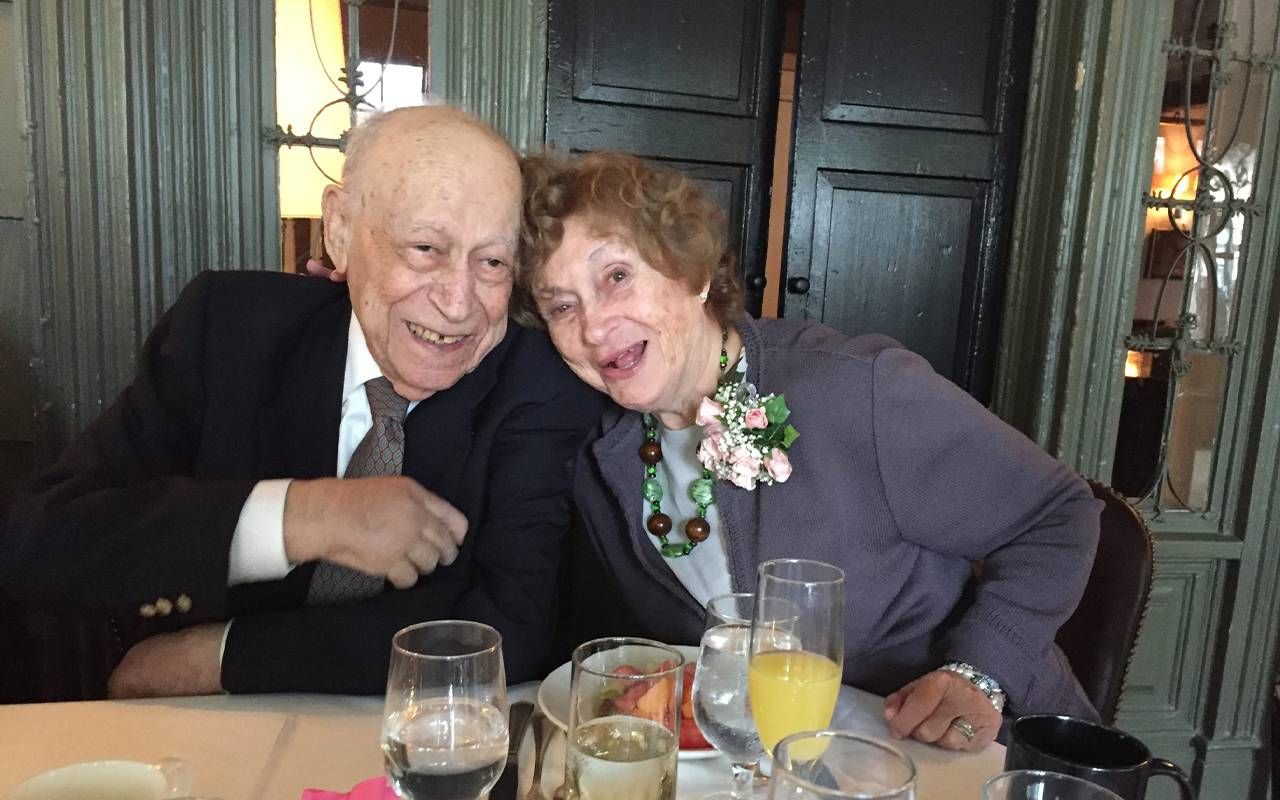I'm a Doctor and It Was Hard to Talk to My Mother About Drinking
Research shows that even small amounts of alcohol can be harmful. When my 85-year-old mother fell after a drink, the issue got personal.
At 85, my mother loved her chardonnay. Rarely more than a single glass, and always in social situations. Hardly a "drinking problem" by official medical standards. But then, a single glass of wine led to a fall that landed her in the emergency room with a fractured wrist.

Because I am a physician and the daughter who lived closest to her apartment, I was the one who met her at the emergency room. Though I knew it was a drink that helped send Mom careening to the floor, I didn't want to be the one to tell that to the ER doctors. It would have embarrassed her, and she would have considered me a family traitor.
And now, a fall after a glass of wine on a lunch date with friends.
So I kept quiet, but my loyalty to her privacy as a daughter grated against my instincts as a doctor. Mom was prone to falling. She had mild dementia, tricky knees and used a cane. There had been a hip fracture after a slip on ice and a dislocated shoulder after a fall in a restaurant bathroom. And now, a fall after a glass of wine on a lunch date with friends.
Her Goal to Escape 'Home Confinement'
Still, she lived independently, with the help of home health aides and her three daughters. She had an 87-year-old boyfriend – weekends only. But as she aged, she relied on others to escape what she described as "home confinement." Going out anywhere became a reason to party, and she associated a good time with a glass of wine as never before.
For my sisters and me, the most critical aspect of being a "family caregiver" was helping our mother retain a sense of independence amid the constraints of her aging body. I worried the wrist fracture and six weeks in a cast would compound her declining strength and mobility.
Did this alcohol-induced fall represent a shift in her health status for the worse? The field of palliative care would call a sudden deterioration in physical functioning a tipping event – the moment when independence is lost.
I understood how difficult talking about alcohol use can be with someone we are close to.
My experience as a palliative care doctor helping patients navigate changes in their health has made me sensitive to habits – such as a nightly glass of red wine – that no longer serve a patient's stated health goals. But it wasn't until my own experience with my mother that I understood how difficult talking about alcohol use can be with someone we are close to.
Speaking as a doctor (and someone's daughter), I think it might be helpful to think about a few things before launching into a conversation about alcohol use:
- Consider your drinking practices before asking someone else to cut back.
- Don't assume the health care profession will recognize a drinking issue.
- Get creative about celebrating without alcohol.
Review Drinking Based on Current Research
Health officials' messages for decades have promoted small to moderate amounts of alcohol as heart-healthy (but not too much – that's bad).
Anyone whose carefree drinking years were in the 90s and early 2000s will be familiar with the French Paradox, which attributed the French habit of a glass of red wine with dinner as the reason for their lower rates of heart disease compared to Americans, despite all the buttery cuisine.
What followed, until recently, was a body of medical knowledge favoring alcohol as heart healthy. Less known to the public, however, is the relationship of some of this research to the alcohol industry, putting into question the validity of the claims that alcohol is good for us.
Knowing your alcohol intake over time is an excellent place to start; how many ounces do you take in at a sitting, where and when?
A new study in the Journal of the American Medical Association, in which researchers reviewed and analyzed over 100 studies, totaling several million participants, concluded that statistical bias skewed the results to demonstrate some drinking as healthy.
When these researchers reanalyzed the data, the health benefits attributed to moderate drinking vanished. It also turns out that few Americans know about the link of chronic alcohol use (any amount, any type) to at least seven different types of cancers, notably breast cancer in women.
The evidence of alcohol as a direct cause of cancer in smaller amounts than previously thought is strong enough that the World Health Organization and several national health agencies have reversed positions on alcohol consumption to recommend that optimal alcohol intake is: none.
How does this new research impact a conversation about alcohol? From my physician's perspective, the new recommendations simplify my advice about drinking to patients of any age: less is better. Knowing your alcohol intake over time is an excellent place to start; how many ounces do you take in at a sitting, where and when?
Health Providers Don't Always Recognize Alcohol Risks in Older Patients
In the busy emergency room where my mom and I waited while parked against a corridor wall, I could not trust the staff to uncover her one drink as a health problem. That is because alcohol screening on ER triage gears toward identifying heavier drinking: measured in the number of standard drinks consumed in one sitting.
I wanted the doctor to talk to my mother, without a glance in my direction, about the circumstances of the fall chased by a doctor-style warning about drinking.
The older we get, the body's ability to rid itself of alcohol slows, so much smaller amounts can precipitate health harm. Severe interactions with prescription medications also become likelier, even with small amounts of alcohol. So catching low levels of alcohol consumption as risky can be difficult.
Even as medical research clarifies the downsides of drinking into old age, including links to underlying depression, anxiety or social isolation, doctors don't automatically think of asking about alcohol use in older persons. And for older women, ageist beliefs can make medical professionals assume they are at less risk for alcohol-induced health problems.
As I listened to the ER doctor speak to my mom in tones usually reserved for toddlers, I wondered if this provider unconsciously saw a big baby who drank juice or sipped tea – not a woman who had acquired a boyfriend at 80 and liked mimosas.
When the medical profession does notice a drinking issue, advice to cut back or stop is given against an uptick of marketing campaigns that connect lifestyle choice and personal freedom to happy hour at a bar installed in the senior living community.
Research shows that a brief conversation with a health provider about alcohol harms does help people reduce intake. I wanted the doctor to talk to my mother, without a glance in my direction, about the circumstances of the fall chased by a doctor-style warning about drinking.
That would have supplied me with just the right amount of backup for a future moment when I needed to leverage the official words of the medical profession to divert my mom from that drink. But if the doctor doesn't ask, bring it up as non-judgmentally as possible.
Get Creative About Socializing Without Alcohol
As a daughter, I contemplated how I socialized with my mother. When I passed on the drinks menu (better for me), my mother also cared less about having a drink. When I directly asked her why she wanted a drink, it wasn't the alcohol that mattered; it was about feeling socially included.
This communication approach – digging into the emotion behind a social action – can help alleviate friction in conversations about complex topics like drinking. Cultivate an atmosphere of talking about alcohol reduction to preserve health, not as a penalty for getting older.
Should you resort to trickery? I have been asked this question by my patients' families many times. Social pressure to have a drink in your hand can be intense at any age. Mocktails and non-alcoholic wines abound now; consider adding them to your party menu.
Did my mother (who died at 92) always know when her drink was alcohol-free? I plead the fifth.


